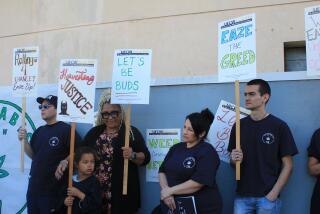U.S. Supreme Court rejects grower’s challenge to state mandatory labor contract law
The U.S. Supreme Court on Monday rejected a petition by a California fruit grower to weigh the constitutionality of a state law that allows a mediator to impose an agricultural labor contract on deadlocked parties.
The court’s refusal to hear the case ends a long-running fight with the state’s Agricultural Labor Relations Board by Dan Gerawan, a Reedley, Calif., grower who was forced in 2013 to accept a contract covering about 3,000 of his workers after collective bargaining with the United Farm Workers had reached an impasse.
The action by the nation’s highest court comes less than a week after the Agricultural Labor Relations Board validated a 2015 election by Gerawan workers ousting UFW, which made the contract moot.
“We knew it was an uphill battle,” Gerawan said of the court’s rejection of his petition to consider the case. “I’m certain they will eventually overturn it, but without the forced contract in effect, we don’t have standing.”
The workers at the state’s largest grower and packer of peaches, nectarines and other stone fruit now have neither a union nor a labor contract and won’t have to pay 3% dues to UFW.
The union had first organized Gerawan’s workers in 1990, and was certified as their collective bargaining representative two years later. Talks stalled, then stopped, and UFW shifted its tactics to pushing for more favorable labor laws in Sacramento.
The state responded in 2002, expanding California’s landmark Agricultural Labor Relations Act to allow a mediator to impose a contract on stalemated parties under certain conditions. That law was amended in 2011 to make it easier to request mediation.
Eight months later, the UFW reasserted its right to negotiate on behalf of Gerawan’s workers, most of whom had not voted in the original 1990 election. When renewed talks stalled, UFW requested a mediator, who imposed a contract that was approved by the agricultural labor board in the fall of 2013.
Gerawan has contended that the UFW never contacted him about renewing talks for 18 years, then returned to the table with the intent to let time expire so a mediator could impose a contract and allow the union to collect 3% dues from his workers.
The UFW has said that it made 14 contract offers between 1995 and 2012, but did not specify when those overtures were made.
The contract imposed by the mediator called for yearly wage increases, vacation benefits, a grievance procedure and tightened rules for terminating workers.
Gerawan sued, claiming that the state law unconstitutionally deprived him of equal protection under the law. A state district court agreed in 2015, but the state Supreme Court overturned the decision two years later, leading Gerawan to appeal to the Supreme Court.
In the meantime, Gerawan workers organized and won the right to hold an election on whether to keep the UFW as their collective bargaining representative. The vote was held in 2015, but the Agricultural Labor Relations Board invalidated the election, saying unfair labor practices by Gerawan had tainted the process.
Ballots were impounded until a state appeals court judge ordered the board to count the ballots and reconsider its ruling that Gerawan’s actions favoring the vote effort had affected the outcome of the election.
Last Thursday, the board found that Gerawan’s actions didn’t affect the outcome, which showed 1,098 workers rejected the union and 197 supported it — with 660 other ballots in dispute and 18 nullified.
Follow me: @LATgeoffmohan







